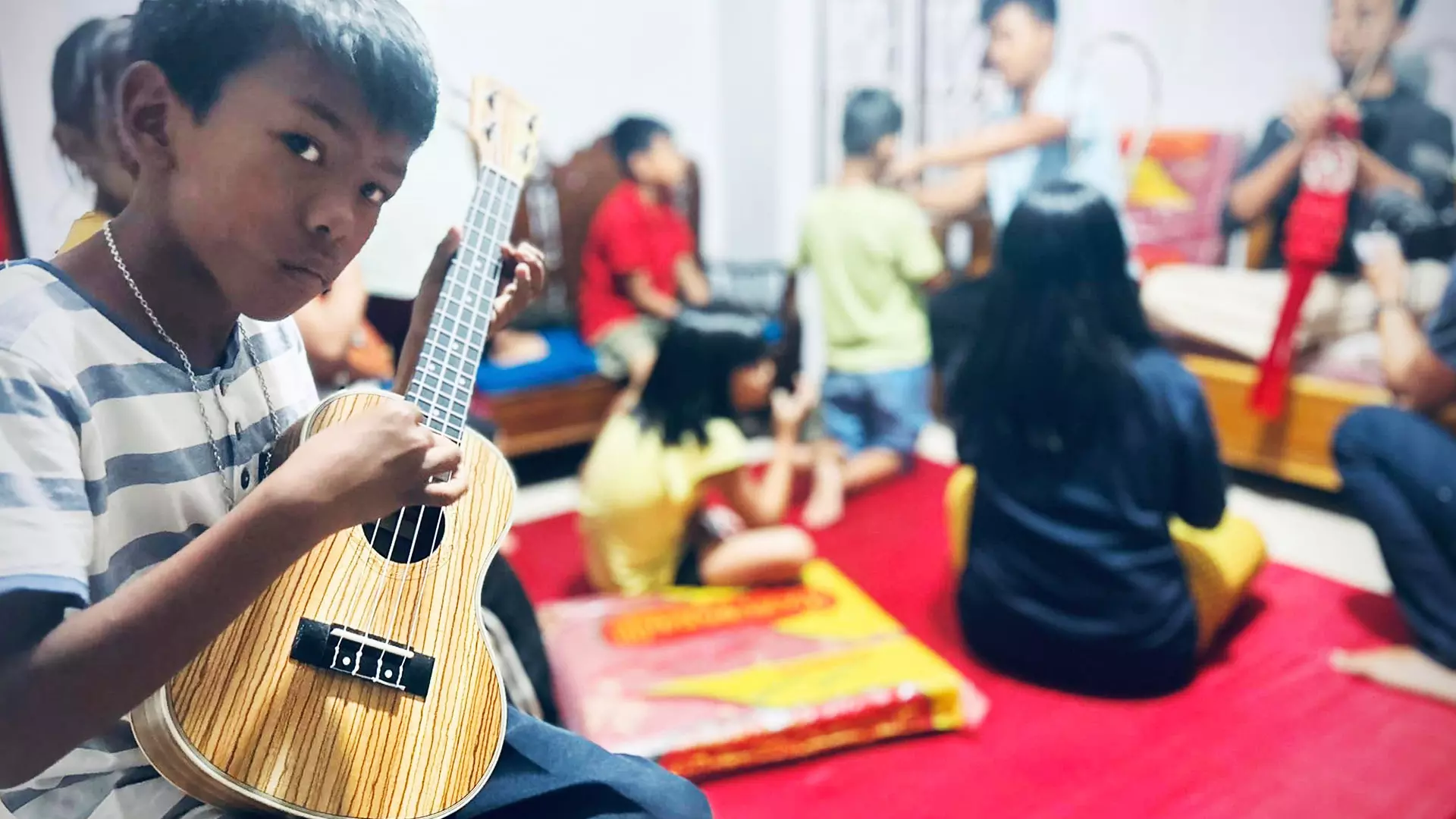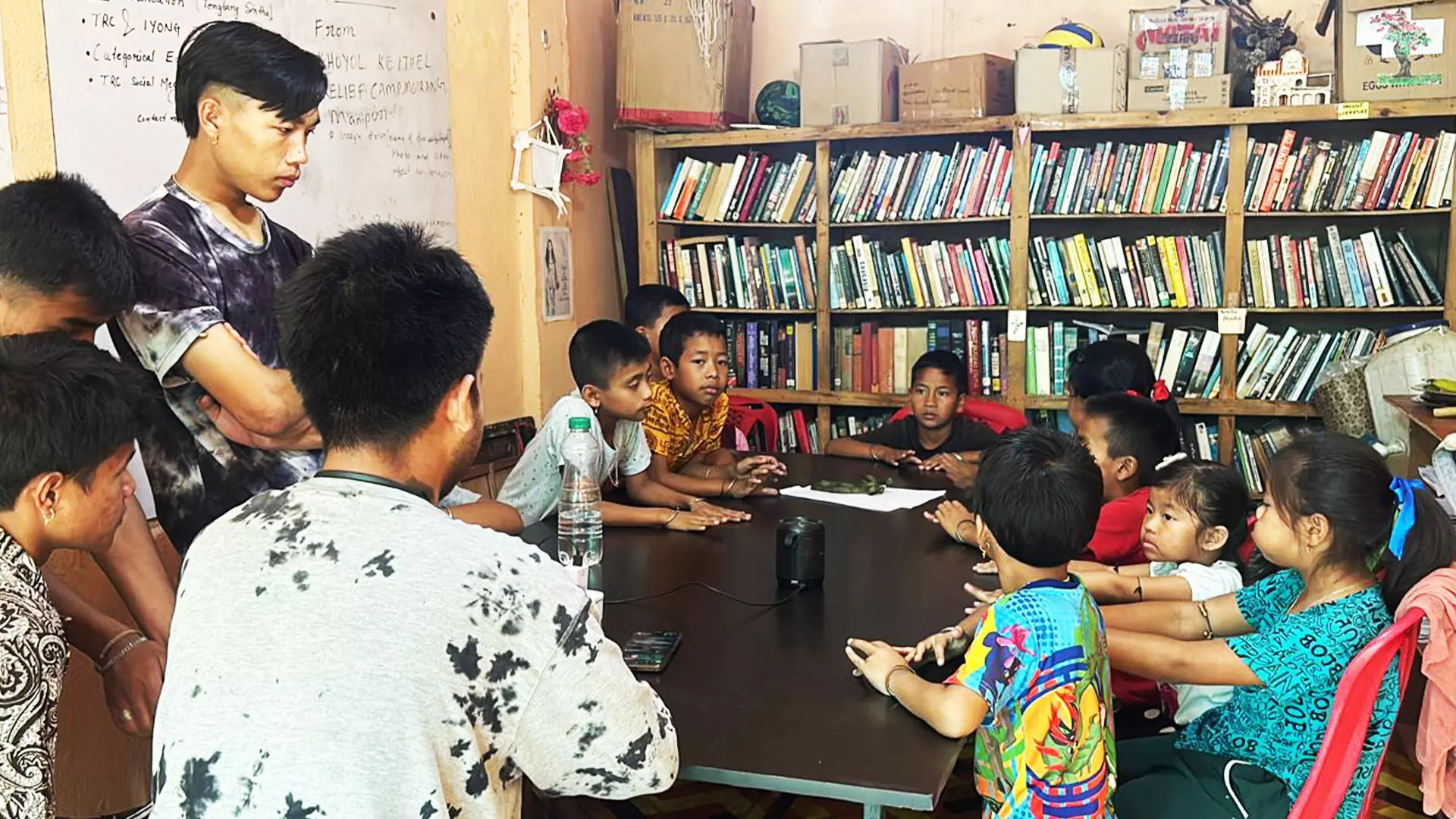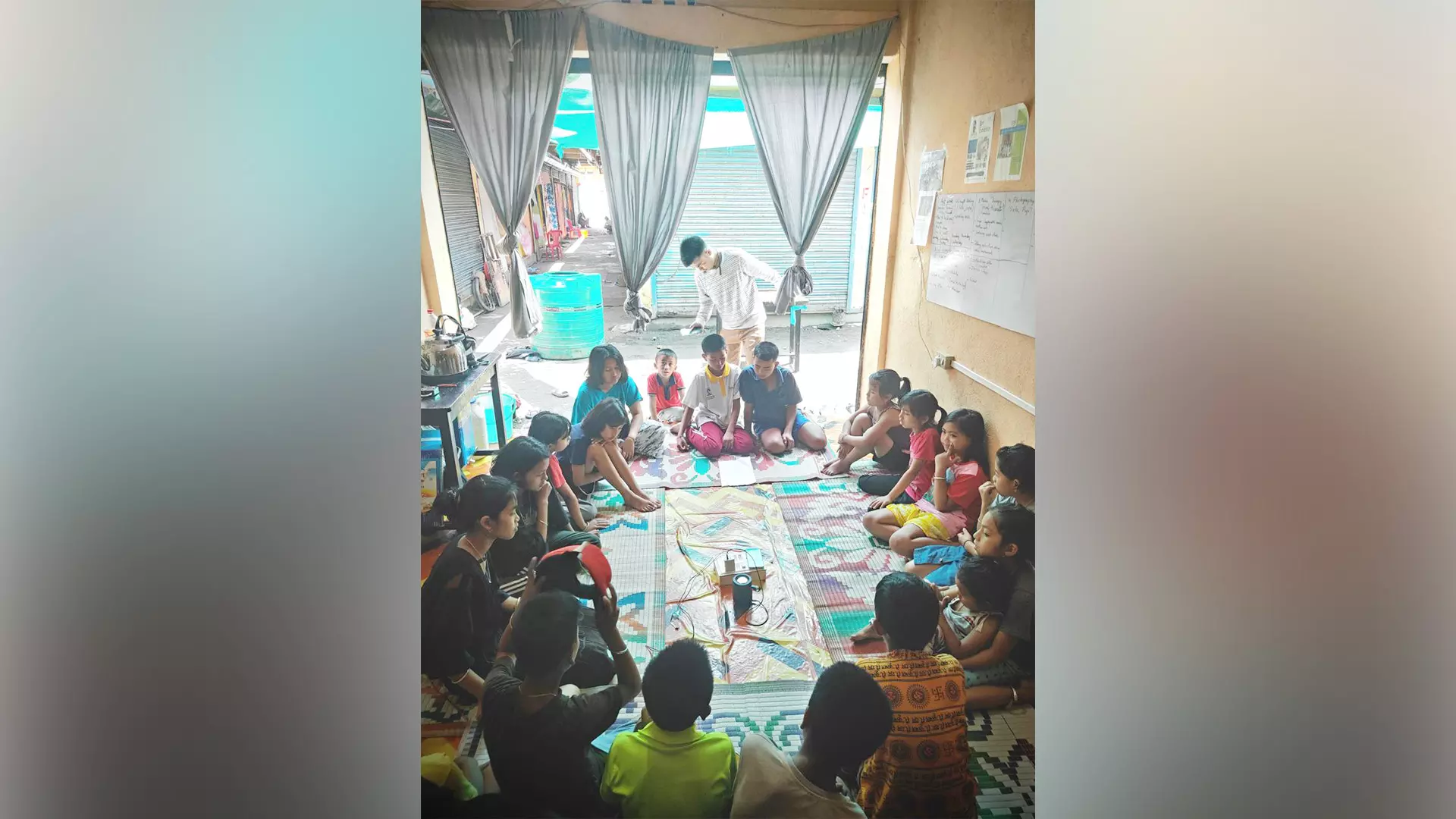
- Home
- India
- World
- Premium
- THE FEDERAL SPECIAL
- Analysis
- States
- Perspective
- Videos
- Sports
- Education
- Entertainment
- Elections
- Features
- Health
- Business
- Series
- In memoriam: Sheikh Mujibur Rahman
- Bishnoi's Men
- NEET TANGLE
- Economy Series
- Earth Day
- Kashmir’s Frozen Turbulence
- India@75
- The legend of Ramjanmabhoomi
- Liberalisation@30
- How to tame a dragon
- Celebrating biodiversity
- Farm Matters
- 50 days of solitude
- Bringing Migrants Home
- Budget 2020
- Jharkhand Votes
- The Federal Investigates
- The Federal Impact
- Vanishing Sand
- Gandhi @ 150
- Andhra Today
- Field report
- Operation Gulmarg
- Pandemic @1 Mn in India
- The Federal Year-End
- The Zero Year
- Science
- Brand studio
- Newsletter
- Elections 2024
- Events
How children in Manipur’s relief camps are raising a musical cry for help

About 20 internally displaced children in a West Imphal rehabilitation camp recently experienced the magic of singing into a microphone. They practised well for about a month and on March 26, they entered a make-shift studio in a school-turned relief camp in Phayeng, to record it.The song, Chingya-Gee Khangpoksang (A Song From a Relief Camp), released on May 3 — also the day Manipur completed...
About 20 internally displaced children in a West Imphal rehabilitation camp recently experienced the magic of singing into a microphone. They practised well for about a month and on March 26, they entered a make-shift studio in a school-turned relief camp in Phayeng, to record it.
The song, Chingya-Gee Khangpoksang (A Song From a Relief Camp), released on May 3 — also the day Manipur completed a year of ethnic violence — is one of the projects led by a collective of compassionate musicians in Imphal.
At the same time, in Moirang, about 45 km from the state’s capital, another song, Ri Ya Ri, was taking shape. Sung by 12 children from Khoyol Relief Camp, this yet-to-be-released number is led by another collective of like-minded musicians.
In the past year, violence has stripped Manipur of its musical vibrancy. With over 200 casualties, nearly 60,000 internally displaced people (IDPs) in temporary shelters, and ongoing reports of gunfights, arson, and kidnappings across several districts, music is likely the last thing on most people's minds.
Yet, as often happens with music, these songs remind us of its innate power to emerge from the unlikeliest of corners; in times of utmost uncertainty. Reaffirming that music cannot be silenced, these songs from the relief camps, in their cores, echo a cry for help particularly for the children who have been robbed of their childhoods.
Jams at Phayeng and Moirang
Aiming to provide some solace and a sense of normalcy to the children of the camp in Phayeng, popular band Imphal Talkies, along with several musicians affiliated with an initiative, A Native Tongue Called Peace, decided to create a song with the inmates of the relief camp.
After getting to know a bunch of children during several visits to the camp, they sat down with them and wrote one. Following recording and post-production, Chingya-Gee Khangpoksang was released and till date, has garnered about 45,000 views on YouTube.
Under the guidance of the band’s frontman, composer and lyricist, Akhu Chingangbam, the moving lyrics of the song found voice in the children’s singing. Recorded at KBS studios in Imphal, the collaboration also features musician James Riame, a Rongmei Naga musician on vocals along with Akhu himself.

Children during music classes at the Khoyol Relief camp. Photos: Chaoba Thiyam
“Our team from A Native Tongue Called Peace, a not-for-profit music project established in 2015 to support children from diverse ethnic backgrounds, has been working in rehabilitation camps for some time to aid the affected. During one of our visits, we sat down with the children at the camp, wrote the song and made them sing it. We recorded it with 20 kids living there, but the final cut features only 7 to 8 of these recordings,” says Akhu.
The singer-songwriter shared the challenges faced in raising funds for the recording, studio hours, and video production of the song. “I received some support, but it wasn't sufficient. As a musician, I rely on gigs and other musical engagements, but with nothing happening, it was tough,” he explained.
Meanwhile, the yet-to-be released, Ri Ya Ri, is led by the experimental folk ensemble, Siyom and a few like-minded musicians. “We have been collaborating with the children from Khoyol Relief Camp for over 10 months. Our journey began in June 2023, the inception of Ri Ya Ri, however, began just a month ago and the kids did a great job," shares Chaoba Thyiam, the creative director at Siyom and the founder of Resilient Roots and Healing Hearts, a musical project aimed at addressing trauma in conflict-affected youth and children.
Chaoba, along with the Matai Society of Manipur, an inclusive society advocating for queer, trans persons and women, has been actively involved in relief and rehabilitation efforts in and around Moirang and this song is their collective dream.
Ri Ya Ri is a product of a crowdfunding initiative spearheaded by Chaoba and three musicians from other bands. This initiative took flight a few months after violence erupted in Manipur on May 3, 2023. To bring their musical vision to life, the collective initially took to Instagram, hosting live jam sessions for fans, which garnered significant support.
“Through crowdfunding, we managed to raise about Rs 30,000. The generosity of donors extended beyond money; some offered musical instruments upon learning that the proceeds would benefit children in a relief camp. Playing in the Echoes of the Valley Festival in March in Kathmandu, Nepal, also helped. Thanks to the organisers, we got a few additional gigs in the country and collected some funds for the song’s production,” says Thyiam.

The songs express hope for future generations amidst ongoing turmoil.
Penned by children rhyme lyricist, Eche Sobita, the song is a mix of traditional lullabies and rhymes that draws inspirations from children’s fantasy literature. “Ri Ya Ri draws its vision from fertile imaginations of children but with a message,” informs Chaoba.
Utilising a kite as a metaphor for children affected by the year-long violence, the lyrics, sung in Meitei, express hope for future generations amidst ongoing turmoil.
Music as a beacon of innocence
Reflecting on the significance of the song Chingya-Gee Khangpoksang, Akhu believes that the ongoing violence has had the most severe impact on the lives of children. Amidst the cacophony of news, reports, and opinions, he observes that people have forgotten about them.
“It seems everybody is preoccupied with discussing the bloody war between the Meities and the Kukis, overlooking the plight of those in the relief camps. What about their voices? No one seems to care. These people need to go home; we can't keep them there forever. Through the song, we are trying to remind people about the children and their living conditions,” says Akhu.
He stresses on the need for the children to maintain their innocence. By involving them in the process of jamming and songwriting, he hopes to preserve their connection to simpler joys, such as watching cattle graze in paddy fields or waking up to the chirping of birds. “These simple pleasures are now lost to them, and it's our responsibility to help them remember,” he says.
“I am a victim of the violence, but I am not someone who has lost a family member or displaced. But these children have. Whoever we spoke to at camps told us that it haunts them. It's been a year; their houses were burnt; all this trauma keeps coming back to them,” he adds.
Chaoba perceives a collective sense of guilt within society for exposing children to the horrors of the crisis. He believes that deep down, everyone is feeling “guilty of bringing this war upon the children”. “Ri Ya Ri carries a feel of repentance—a guilt that every father, mother, and the society as a whole is experiencing because we acknowledge that we have failed our children," Chaoba adds.

Violence has had the most severe impact on the lives of children. The songs are aiming to act as the much-needed succour.
Davidson Kumam, the founder of the Matai Society, adds that through Ri Ya Ri they have taken the liberty to convey a crucial message that children should not be subjected to the horrors of “war”.
“We collectively acknowledge our responsibility and apologise to these children for denying them the peaceful environment they rightfully deserve. Our aim is to connect with the children, engaging them musically to create a creative environment. Together, we hope to reflect, grow, and rebuild. The final product is not the goal; enjoying the process is,” he says.
